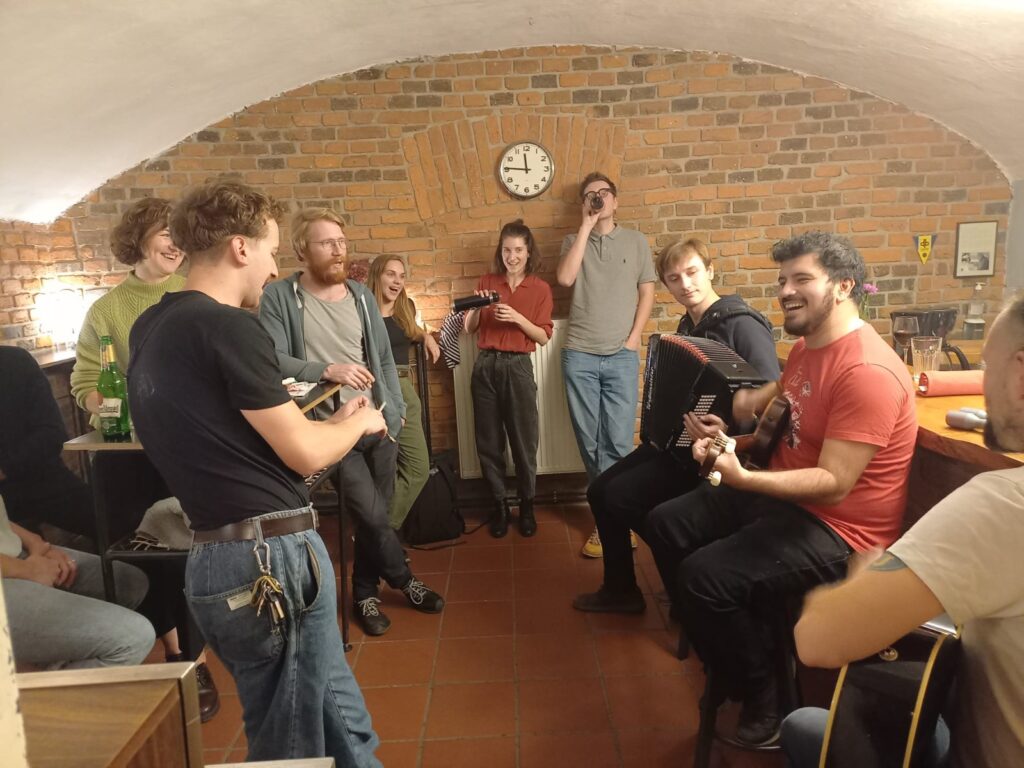Zápisník
Reciprocita v tomhle případě neplatí: rozhovor s Mariem Guzmánem o chilské komunitě v Praze
7. 11. 2022
☞☞ scroll down for english version
Během příprav inscenace La Moneda jsme se setkali s několika Chilany žijícími v Praze, jedním z nich byl i Mario Guzmán. K příležitosti derniéry La Monedy jsme Maria požádali o rozhovor, během kterého jsme se bavili o chilské komunitě v Praze, o tom, proč se přestěhoval do Prahy a o osudech dalších Chilanů žijících zde.
Petr: Jak velká je vlastně chilská komunita v Praze?
Mario: V Čechách žije kolem sto dvaceti lidí z Chile a asi čtyřicet z nich žije mimo Prahu.
Petr: Máš představu, proč si lidé vybrali zrovna tohle město?
Mario: Někteří lidé sem přišli během Pinochetovy éry, jiní sem přišli podnikat, někteří studovat. Existuje tady velká komunita chilských vědců – zejména v astronomii a fyzice. Pracují na Karlově univerzitě, kde mají jakousi komunitu supermyslí. Nicméně Česká republika není v Chile tak známá, takže většina Chilanů by v případě emigrace šla spíš do Německa, Francie nebo do Španělska. Ti, kteří sem přišli, přišli většinou z toho důvodu, že se jejich cesty protnuly s Českou republikou velice intimním způsobem: buď kvůli studiu, nebo kvůli lásce.
Petr: A to je i tvůj příběh? Láska?
Mario: Ano, je to můj příběh. Jsem právník a potkal jsem asistentku na Českém velvyslanectví v Santiagu. Chvíli jsme žili v Chile a pak jsme přijeli sem a vzali se.
Petr: Vytvářejí Chilané komunity?
Mario: Máme komunity, ale chilské komunity většinou netrvají dlouho. V Chile často dochází k přírodním katastrofám – k zemětřesení, tsunami, nebo tam explodují sopky. Pokaždé, když dojde k nějaké katastrofě, tak se Chilané shromáždí. Ale po nějaké době zase začnou žít víc individualizovaně. Tady v Praze máme kulturní a sportovní komunitu. Hrajeme fotbal.
Petr: A tyhle komunity taky vznikly kvůli nějaké katastrofě?
Mario: Vlastně ano. Nebyla to přírodní katastrofa, ale byly to říjnové demonstrace v roce 2019. Jen si to představ tohle: zítra v Česku začne demonstrovat čtyři nebo pět milionů lidí proti systému a armáda proti nim vyjde do ulic. Armáda zastřelí přibližně padesát lidí, dva tisíce jich sexuálně zneužije – zejména ženy – a tím to nekončí. Máme deset tisíc politických vězňů. Dobře, někdo by řekl, že to nejsou političtí vězni – ale je to tak, deset tisíc lidí šlo do vězení kvůli demonstracím. Někteří z nich zapalovali věci a páchali skutečné zločiny – ale většina z nich ne. A nakonec kolem pěti set lidí skončilo s poškozeným zrakem, protože jim policisté stříleli do obličeje, zhruba polovina z nich přišla buď částečně nebo zcela o zrak. Když se to dělo, moc Chilanů jsem tady neznal, ale někdo tehdy inicioval, že se sejdeme na Václavském náměstí, abychom společně truchlili – a tak jsem poznal většinu chilské komunity.
Petr: Takže ty už jsi bydlel v Praze, když tyhle demonstrace probíhaly?
Mario: Ano.
Petr: Když jsme začali zkoušet La Monedu, bavili jsme se s jedním z tvých přátel o tom, jak se v Česku žije bez azylu. Znáš jeho příběh?
Mario: Znám. Byl deportován. Důvodem bylo zamítnutí jeho žádosti o politický azyl, protože Česká republika stále uznává Chile jako demokratickou zemi. A pro získání azylu je jednou z podmínek, že žadatel pochází z nedemokratické země, což podle mého skromného názoru není správné. Smutné na tomto případu je toto: ve většině světa má stát moc omezit vaši svobodu pohybu pouze v případě rozhodnutí soudce – obzvlášť pokud jde o kriminální případy. Vzetí do vazby je možné jen na základě rozhodnutí soudce. Problém imigrace je zde v tom, že svoboda pohybu je brutálně omezována bez souhlasu soudce – pouze na základě kritérií Ministerstva vnitra. Ve zkratce: politický orgán vládne bez protiváhy ve věcech svobody pohybu.
Petr: A to se stalo tvému známému?
Mario: Ano. Možná měli pravdu, když jeho žádost neuznali, ale to ještě neznamená, že člověk může strávit šest měsíců v deportačním centru se vším špatným, co je s tím spojeno a co tam probíhá.
Petr: A to se stalo se tady v Čechách?
Mario: Ano, tady. Pro mě je to šokující. Protože to není srovnatelné: nemít správné papíry a být skutečným zločincem. Vždyť i práva zločinců jsou posuzována soudci. V případě přistěhovalců se sice nejedná o vězení – ale z praktického hlediska je to totéž. Jste uzavření na jednom místě proti vlastní vůli. Účtují vám ubytování a jídlo a když vás vyhodí, pošlou vás domů s účtem k zaplacení, abyste se už nikdy nevrátili.
Pro mě je na tom šokující, že s Čechy takto zacházeno nebylo, když v Chile žádali o azyl. A Čechů v Chile nebylo sto, přes tři tisíce jich tam uteklo před hrůzami nacismu a komunismu. Byl tam dokonce Baťův průmysl. Mnoho Čechů tam odešlo. Dokonce někteří místní politici byli Češi. Byla tam velká česká komunita. O reciprocitu zde tedy nejde.
Nicméně nemyslím si, že by to většina Chilanů vnímala jako problém. I pro mě je to jediný případ, který znám, že Chilan žádal o azyl v České republice. Většina Chilanů sem přijíždí s pracovními vízy nebo s tzv. „work and holiday“ – a pak si najdou práci, nebo se zamilují. Většinu z nich ani nenapadne, že by se jim něco podobného mohlo stát. Ale lidé, kteří znám, jsou překvapeni, jak tvrdě je zde migrační politika nastavena.
V Praze, 15. října 2022

Reciprocity is not the case here: interview with Mario Guzmán about the Chilean community in Prague
When we were rehearsing the production of La Moneda, we met several Chileans living in Prague, one of them was Mario Guzmán. On the occasion of the last show of La Moneda, we asked Mario for an interview. We talked about the Chilean community in Prague, why he moved to Prague and the fate of other Chileans living here.
Petr: How big is the Chilean community in Prague actually?
Mario: Moreover, there are around 120 people in Czech republic and around 40 people live outside of Prague.
Petr: Do you have any idea why did the people chose this city specifically?
Mario: There are some people who came during the Pinochet era, some others came here to do business, some come here to study. There is a large community of Chilean scholars – especially in astronomy and physics. They are working at Charles University and they have a community of superminds here. But the Czech Republic is not that well known in Chile. So, most Chileans would go to Germany, France or Spain. But the ones that came here, usually did it because they crossed paths with the Czech Republic in a very intimate way: studies or love.
Petr: Is it your story as well?
Mario: Yes, it is my story. I am a lawyer. And I met an assistant of the Czech Consulate in Santiago. We lived in Chile for a while and then we came here, and we got married.
Do Chileans create a community?
Mario: We do have communities, but Chilean communities do not often last long though. In Chile there are often natural catastrophes. We always have earthquakes, tsunamis, volcanoes exploding and every time there is a big catastrophe, Chileans rally together. However, after some time, they get more individualistic. Here in Prague we have a cultural and sportive community. We play football.
Petr: And is there some kind of catastrophe that brought you together?
Mario: Actually, yes. It was not a natural catastrophe, but it was the demonstrations of October 2019. Just imagine this: tomorrow, here in Czech Republic there would be four or five million people demonstrating against the system and the army would go to the streets, shoots 50 people aprox., 2000 people or more would get sexually abused, especially women, and it wouldn’t end there, we have 10 000 political prisoners. Well, some people would say they are not political prisoners, but we have 10 000 people going to jail because of demonstrating. Some of them do burn stuff and commit actual crimes, but not most of them. Finally, around 500 people got their eyes injured because policemen shot at their faces, around half of them lost vision totally or partially. Imagine this happening here! I didn’t know many Chileans when this happened here, but someone said “let’s go to Vaclavske square” to grief together and that is how I met most of the Chilean community.
Petr: So you were living in Prague when these demonstrations happened?
Mario: Yes.
Petr: When we started rehearsing La Moneda, we talked with some of your friends about how it is to live without asylum in the Czech Republic. What are your thoughts on this?
Mario: He was deported. The reason is that his request for political asylum was denied because the Czech Republic still recognizes Chile as a democracy and it is a requirement that you are from a non-democratic country to get asylum, which is, in my humble opinion, not correct. What is sad about this case is this: in most of the world, the state has the power to coerce your freedom of movement only with the intervention of a judge, especially when it comes to criminal cases. Remand in custody is allowed with the intervention of a judge. The general rule is that no one should go to jail, nor his or her freedom of movement be restricted without the intervention of a judge. The problem of immigration here is that without the approval of a judge you get your freedom of movement restricted, only based on the criteria of the Ministry of the Interior: in short, a political authority rules without counterweights on matters of freedom of movement.
Petr: And that is what happened to your friend?
Mario: Yes. They might have been right to not ground his request, but it doesn’t mean that you can spend six months in a deportation center with all the bad things and associations.
Petr: Did it happen here in the Czech Republic?
Mario: Yes, here. For me it’s shocking. Because it is not comparable – the fact of not having the correct papers than to actually be a criminal. Even criminals get their rights reviewed by the judge. When you are an immigrant – it is not a jail, but for practical purposes it is practically the same. You are located in one place against your will. They charge you accommodation and food, everything. And when they kick you out, they send you home with a bill to pay so you never come back.
For me, what is shocking about it is that Czechs did not receive this treatment in Chile when they were asylum seekers. They were not a hundred in Chile, there were over three thousand people in Chile escaping the horrors of nazism and communism. There was even a Baťa industry. Many Czechs left there. And even some local politicians were Czechs. There was a big community. So reciprocity is not the case here.
However, I don´t think most Chileans would perceive this as a problem. For me, this is the only case I know of a Chilean requesting asylum in the Czech Republic we have ever seen. Most Chileans come here with a work visa or they come with ´work and holiday´ – and then they find a job, or they fall in love. So most of them don’t even think that this could happen to them. But people I know are surprised about how harsh is migration policy here.
Prague, 15th October 2022





